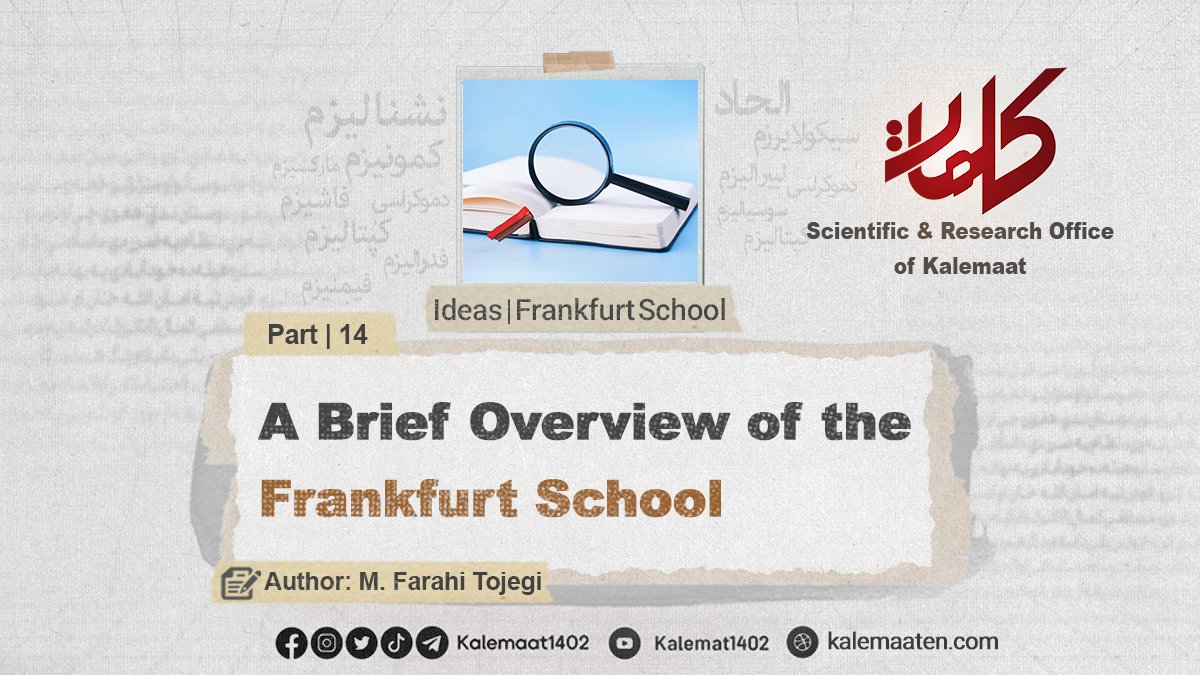Author: M. Farahi Tojegi
A Brief Overview of the Frankfurt School (Part 14)
Max Horkhamer (Hork -hy-mer) founded the Frankfurt School at the University of Frankfurt and brought prominent figures such as Theodor Adorno, Herbert Marcuse, and Walter Benjamin to the world. The general tendency of the supporters of this school was Marxism. The critical school includes criticism of society as well as various epistemological systems. Its ultimate goal is to reveal the nature of society more accurately. Its main criticisms are:
A: Criticism of Marxist theory;
B: Criticisms of positivism;
C: Criticisms of sociology;
D: Criticism of modern society.
Critical theory is also the product of a group of German neo-Marxists of this school who were unhappy with the state of Marxist theory, especially its tendency towards economic determinism. This theory is mostly made up of criticisms that have arisen from various aspects of social and intellectual life. This theory is inspired by the work of Marx, and the main goal of critical theory is to show power relations within the framework of cultural phenomena.
In this article, we tried to have a brief look at the Frankfurt School and social theory through the attribution method to this school.
Summary and Conclusion
As mentioned at the beginning of the article, the Frankfurt School was formed after the failure of the European Marxist movements and, by criticizing positivism, called for a new interpretation of Marx’s model; therefore, its theoretical discussion focused more on super structural structures, especially the mass media, which, in their opinion, had played an important role in diverting the process of economic change from its historical path.
Some Frankfurt School scholars, such as Horkheimer (Hork -hy-mer) and Adorno, emphasized the destructive role of the dominant capitalist economy by introducing cultural industries and mass culture, and believed that the capitalist system succeeded in selling itself by resorting to mass production, providing short-term services, and using the mechanism of rationalizing technology, etc.
Frankfurt School thinkers considered the role of the media in contemporary societies to be preserving and stabilizing the status quo, and stated that the system of domination in society causes passivity and integration of thoughts, and capitalism is trying to squeeze the masses more and more into its grip by rationalizing its system of domination. In Habermas’ words, “The social world is caught in the grip of the colonialism of the social system, and in order to free itself from it, the social world must be rationalized with appropriate methods.”
Of course, rationalization is meant as a result of understanding and communicative action.
Marcuse, with his concept of “One Dimensional Man”, Horkheimer (Hork -hy-mer) and Adorno with their concepts of “packaged culture and the culture industry”, and Habermas with his theory of “communicative action and the public sphere”, tried to find a way out of this situation while criticizing modern society and mass media. Therefore, the critical theory of the Frankfurt School in its mature and flourishing stage included three interrelated elements:
First: a critique of the epistemology of method; a knowledge of positivism;
Second: a critical attitude towards the ideological influence of science and technology, especially the cultural and media technologies of capitalism, as the main factor in creating a new form of bureaucratic domination;
Third: a kind of preoccupation with the culture industry and more generally with the cultural aspects of domination, which were mainly created by monopoly capitalism and through propaganda.
In conclusion, it is necessary to say that most sociologists believe that the Frankfurt School in its original form is dead as a branch of Marxism or sociology. Over the past few decades, the development of Marx’s thought in the social sciences, especially in anthropology, economics, and sociology, has taken a path that brings it closer to the main points of interest of Marx’s theory; while the preoccupation with the phenomenon of the culture industry, which was a characteristic feature of the works of Adorno and Horkheimer (Hork -hy-mer), has diminished. In general, in summarizing Habermas’s achievements, it is also evident that he has distanced himself from the ideas and beliefs of the Frankfurt School. In a sense, he has followed the path traveled by Adorno and Horkheimer (Hork -hy-mer) by attaching great importance to the theory, specifically Marxist, of society; Therefore, he paid more attention to the analysis of political and economic structures, and at the same time, unlike them, there are few references to the culture industry in his works.
Continues…
Previous Part/ Next Part
References:
- Ahmadi, Babak (1954). Modernity and Critical Thought. Tehran: Adineh Book Center.
- Eftekhari, Asghar (196). Rereading the Critical School in the Field of Social Sciences. Tehran: Imam Sadeq University.
- Kant, Immanuel (1959). The Measurement of Pure Reason. Soltani, Mir Shams al-Din Adib (translator). Tehran: Amir Kabir.
- Christian, Fuchs (1964). Critical Theory of Information. Mehdi, Shaghaghi (translator). Tehran: Chapar Publications.
- Nozari, Hossein Ali. (1959). Critical Theory and the Frankfurt School in Social and Human Sciences. Tehran: Agah Publications.
- Bashirieh Hossein, History of Political Thought in the Twentieth Century, Tehran: Publications, 1959-1969. Vol. 1, p. 169.
- Batamour, Tom. The Frankfurt School. Translated by Hossein Ali Nozari. Nay Publishing House, 1997, Tehran, page 11.
- Ahmadi, Babak. Memories of Darkness: About Three Thinkers of the Frankfurt School. Tehran, Markaz Publishing House, 1997.
- Strinati, Dominic. An Introduction to the Theories of Popular Culture. Translated by Soraya Paknazar. Gam No Publishing House, first edition, 1990, Tehran, page 86.
- Azad Barmakki, Taghi. Theories of Sociology. Soroush Publishing House, 1998, second edition, page 120.
- Horkheimer, Marx and Theodor Adorno. The Industry of Culture, Enlightenment as Mass Deception. Translated by Morad Farhadpour. Arghanun Quarterly, No. 18, Fall 2000, page 36.



